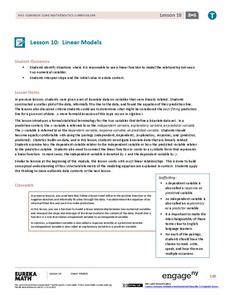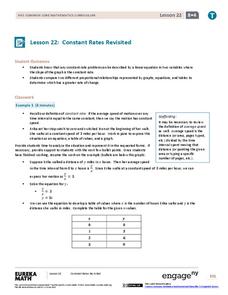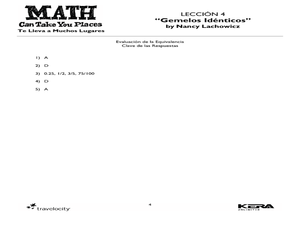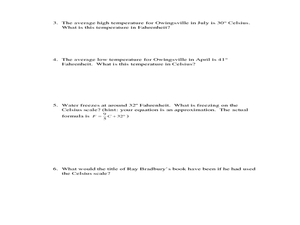National Research Center for Career and Technical Education
Break-Even Point
How do companies determine the prices of their products? Marketing maestros discover the concepts of cost and break-even point through discussion, independent practice, and a collaborative assessment. The career and technology-oriented...
EngageNY
Linear Models
Expand your pupils' vocabulary! Learn how to use statistical vocabulary regarding linear models. The lesson teaches scholars the appropriate terminology for bivariate data analysis. To complete the module, individuals use linear...
Virginia Department of Education
Quadratic Curve of Best Fit
Class members create a table of the number of chords that can be drawn given the number of points on a circle. Pupils analyze the data created, find a function to fit to it, and use the function to make further predictions.
EngageNY
Constant Rates Revisited
Find the faster rate. The resource tasks the class to compare proportional relationships represented in different ways. Pupils find the slope of the proportional relationships to determine the constant rates. They then analyze the...
Beyond Benign
The Big Melt: Arctic Ice Caps
Are the Arctic ice caps really melting out of existence? Junior climatologists examine the statistics of ice decline through four math-based lessons. Each activity incorporates data, climate information, and environmental impact into an...
Kenan Fellows
Introduction to a Flight Computer
Keep your hands on the wheel—at all times! Scholars learn why pilots use a flight computer through a high-flying demonstration. Making calculations for speed, distance, or time is automatic if you know how to use a flight computer.
American Statistical Association
What Fits?
The bounce of a golf ball changes the result in golf, mini golf—and a great math activity. Scholars graph the height of golf ball bounces before finding a line of best fit. They analyze their own data and the results of others to better...
Curated OER
Combining Expressions 2
In this expression worksheet, students combine like terms and perform the indicted operation. They solve problems involving exponents, with multiple variables. There are 15 equations to solve.
Curated OER
Evaluating Expressions
In this expression worksheet, students substitute values for given variables and then simplify the equation. This one-page worksheet contains ten problems, with answers.
Mascil Project
Sports Physiology and Statistics
If I want to build up my heart, where should I start? Science scholars use statistics in a sports physiology setting during an insightful experiment. Groups measure resting and active heart rates and develop a scatter plot that shows the...
Virginia Department of Education
Properties of Compounds and Chemical Formulas
Young chemists have unknown compounds they need to sort. Performing three different tests on each, the chemical behaviors they observe become the basis for data analysis.
Pennsylvania Department of Education
Alike and Different
Students compare and contrast objects and are introduced to a Venn Diagram. In this alike and different lesson, students make observations regarding properties of objects. Students classify object and build ideas about variables....
Curated OER
Love Algebra?
Eighth graders, while in the computer lab, access a web site to help them utilize manipulatives of cups and tiles to develop the skills necessary to understand multi-step equations. They assess the relationship between cups and tiles and...
Curated OER
Fruity Math
Students solve one step linear equations. For this algebra lesson, students manipulate their variables and numbers to answer each problem. They make sure the equations stay balanced at all times.
Curated OER
Open Sentences: Pages 32-36
For this math worksheet, students find solution sets for 5 inequalities. Students also answer true or false for equations, given a value of the variable.
Curated OER
Identical Twins
Sixth graders work with equivalent fractions, decimals, and percents. In this equivalency activity, 6th graders participate in a number of activities aimed at increasing their understanding of equivalent expressions. They form a human...
Curated OER
Related Rates
Twelfth graders rewrite word problems using equations. In this calculus activity, 12th graders solve real world situation using the derivative. They solve problems on rate, and distance.
Curated OER
Celsius to Fahrenheit
Students convert degrees between two different units. In this algebra lesson, students graph linear equations and identify the line of best fit. They use their line of best fit to make predictions given a set of data.
Curated OER
Linear Inequalities
High schoolers explore how to graph a linear inequality. They determine if a point is in the solution set. Students solve linear inquality application problems. They graph linear equations, and solve linear equations for a given variable.
Curated OER
The New Texas Two-Step
Sixth graders work with mathematical expressions by interpreting, analyzing and problem solving with them. For this two step algebraic problem solving lesson, 6th graders use algebra tiles to solve equations.
Curated OER
Changing the Different Currency of Different Countries
Students change the money used in different countries into our currency. In this algebra lesson plan, students rewrite word problems using variables and inequalities. They label each unknown with a letter and identify the steps needed to...
Curated OER
Paper Airplane Science
Fifth graders recognize the need to follow the scientific method carefully and be aware of variables in experiments. In this airplane lesson, 5th graders design and test an airplane, and complete a data sheet. Students retest five...
Curated OER
The Effects of Light Intensity and Wavelength on the Rate of Photosynthesis
Students use an on line website to simulate the effects of light intensity and wavelength on photosynthesis. In this photosynthesis lesson plan, students determine how wavelength of light and intensity of light affect the rate at which...
Curated OER
Graphing at all Levels: It's a Beautiful Thing!
Mixing math and art is done in this lesson by applying graphing knowledge to create a unique piece of art. This lesson varies acording to the graphing knowledge of the artist. First, learners identify and review various types of graphing...























